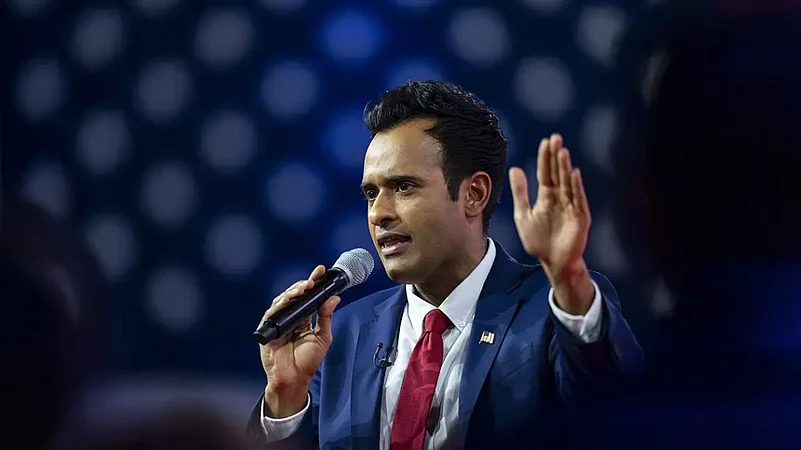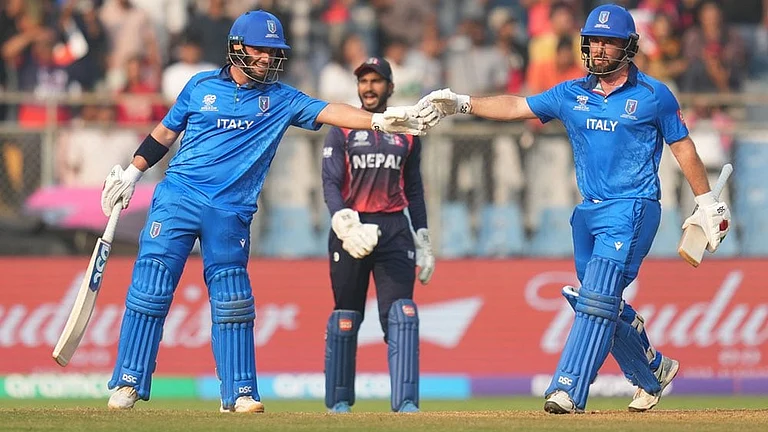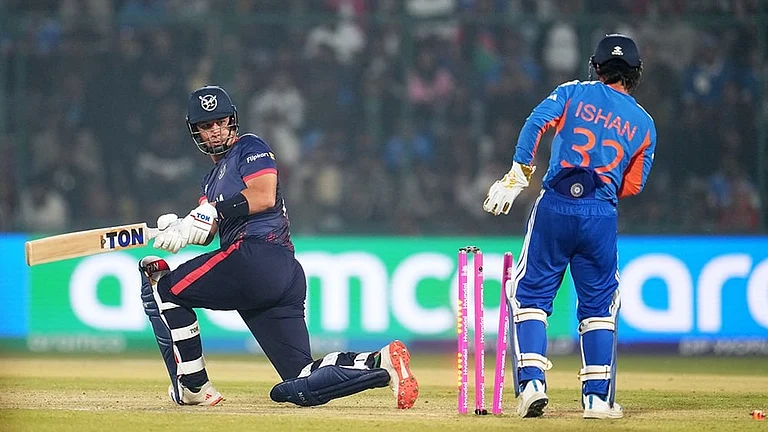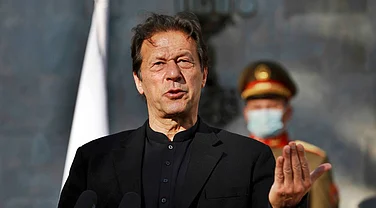From Vivek Ramaswamy to Tim Scott, the Republican presidential candidates are a diverse lot, ranging from Indian-Americans to a Black leader from the South.
Going beyond the skin, Nikki Haley's candidature is particularly interesting as she is running as a woman in a male-dominated party.
For a party leaning substantially right in a country rattled by White Supremacists, the Republican candidates from diverse mninorities are also seeking an unlikely voters' bloc — persons of colour. These candidates have found resonance among voters from minority communities who still continue to face systemic issues despites years of promises.
In a seemingly unlikely development, Indian-American Vivek Ramaswamy has managed to find resonance among minorities by carrying forward the agenda of former President Donald Trump — who is otherwise best known for seeking White Supremacists' support to overturn election results.
Vivek Ramaswamy's pitch to persons of colour
During Trump's first visit as president to Chicago, a frequent target in his attacks on urban violence, he disparaged the nation's third largest city as a haven for criminals and a national embarrassment.
At a recent town hall, Ramaswamy sat alongside ex-convicts on the city's South Side and promised to defend Trump's "America First" agenda. In return, the little-known White House hopeful, a child of Indian immigrants, found a flicker of acceptance in a room full of Black and brown voters.
The audience nodded when Ramaswamy said that "anti-Black racism is on the rise", even if they took issue with his promise to eliminate affirmative action and fight "woke" policies.
Ramaswamy said, "Yes, we criticise the Democratic Party, and for good reason, for talking a big game about helping Black Americans without doing very much to actually show up and help on the ground. But we on our side also talk a big game about America First without actually bringing all of America along with us."
Race has emerged as a central issue —and a delicate one— in the 2024 presidential contest as the Republican Party's primary field so far features four candidates of colour, making it among the most racially diverse ever.
“It is certainly true that there are multiple shades of melanin in this Republican race,” Ramaswamy said in an interview before the event. “I think that in some ways dispels the myth that much of the left will perpetuate that this is somehow you know, a racist party or whatever drivel.”
He added: “But personally, I could care less what someone's skin colour is. I think what matters is, what are they going to accomplish? What's their vision?”
South Carolina Senator Tim Scott is the first Black senator in the South since Reconstruction. He entered the contest earlier in the month.
Scott joined Nikki Haley, a former South Carolina governor and UN ambassador who is of Indian descent, and Larry Elder, an African American raised in Los Angeles' South Central neighbourhood who came to national attention as a candidate in the failed effort two years ago to recall California Gov. Gavin Newsom.
Republicans and Hispanics
Miami Mayor Francis Suarez, who is of Cuban descent, says he may enter the race in the coming days.
As of now, the GOP does not have any Hispanic candidates in the 2024 contest. But Suarez, the Miami mayor, said he may change that in the coming days.
“I think it's important the field does have candidates that can connect with and motivate Hispanics to continue a trend that's already happening,” he said in an interview, noting that he's “very strongly” considering a White House bid. “Democrats have failed miserably to connect with Hispanics."
A majority of Latino voters supported Biden in the 2020 presidential contest, according to AP VoteCast, an extensive national survey of the electorate. But Trump cut into that support in some competitive states, including Florida and Nevada, revealing important shifts among Latinos from many different cultural backgrounds.
Persons of colour and Republican Party
Most of the candidates of colour are considered underdogs in a field currently dominated by Trump and Florida Gov. Ron DeSantis.
Yet the party's increasingly diverse leadership, backed by evolving politics on issues such as immigration, suggest the Republican Party may have a real opportunity in 2024 to further weaken the Democrats' grip on African Americans and Latinos. Those groups have been among the most loyal segments of the Democratic coalition since Republican leaders fought against the Civil Rights Act of 1964.
The Republican presidential contenders of 2024 walk a fine line when addressing race with the GOP's overwhelmingly white primary electorate.
In most cases, the diverse candidates in the Republican field play down the significance of their racial heritage. They all deny the existence of systemic racism in the United States even while discussing their own personal experience with racial discrimination. They oppose policies around policing, voting rights and education that are specifically designed to benefit disadvantaged communities and combat structural racism.
The NAACP recently issued a travel advisory for the state of Florida under DeSantis' leadership, warning of open hostility "toward African Americans, people of colour and LGBTQ+ individuals". The notice calls out new policies enacted by the governor that include blocking public schools from teaching students about systemic racism and defunding programs aimed at diversity, equity and inclusion.
The Republican presidential candidates of colour largely support DeSantis' positions.
What do experts say?
Marc Morial, president and CEO of the National Urban League, said the GOP's policies are far more important than the racial and ethnic diversity of their presidential candidates. He noted there also were four Republican candidates of colour in 2016, the year Trump won the White House after exploiting tensions over race and immigration.
Morial said, "White nationalists, insurrectionists and white supremacists seem to find comfort in the (Republican) Party. I think we're beyond the politics of just the face of a person of colour by itself appealing to people of colour. What do you stand for?"
With few exceptions, the Republican candidates who have entered the presidential primary field have embraced the GOP's "anti-woke" agenda, which is based on the notion that policies designed to address systemic inequities related to race, gender or sexuality are inherently unfair or even dangerous.
DeSantis this past week described such policies as "cultural Marxism".
Still, the GOP's diverse field is not ignoring race. Indeed, some candidates are making their race a central theme in their appeal to Republican primary voters even as they deny that people of colour face systemic challenges.
How is Tim Scott's pitching himself?
Scott insisted that America is not a racist country in his recent announcement speech.
"We are not defined by the colour of our skin. We are defined by the content of our character. And if anyone tells you anything different, they're lying," he said.
Nikki Haley and Larry Elder
In her announcement video, Haley noted that she was raised in a small town in South Carolina as “the proud daughter of Indian immigrants — not black, not white, I was different”. Like Scott, she has defended the GOP against charges of racism.
“Some think our ideas are not just wrong, but racist and evil," Haley said. "Nothing could be further from the truth."
Elder is quick to criticise the Democrats' “woke” agenda, Black Lives Matter and the notion of systemic racism.
Critics say such messages are actually designed to win over suburban white voters more than to attract voters of colour. But on the South Side of Chicago on a recent Friday afternoon, there were signs that some Black voters were open to the GOP's new messengers, given their frustration with both political parties.
Republicans among American minorities
In last fall's midterm elections, support grew for Republican candidates among Black voters, although they remained overwhelmingly supportive of Democrats, AP Votecast found.
Overall, Republican candidates were backed by 14 per cent of Black voters, compared with 8 per cent in the midterm elections four years earlier.
While the shifts may be relatively small, strategists in both parties acknowledge that any shift is significant given how close some elections may be in 2024.
In Chicago, Tyrone Muhammad, who leads Ex-Cons for Social Change, lashed out at Republicans for being “losers” for not seizing a very real opportunity to win over more African Americans. While sitting next to Ramaswamy on stage, he also declared that the Republican Party is racist.
Later, he said he actually voted for Trump in 2020 because Trump enacted a criminal justice bill that aimed to shorten prison sentences for non-violent drug offenders and address racial inequalities in the justice system. While the GOP has since embraced tough-on-crime rhetoric, Muhammed noted that Biden as a senator helped pass the 1994 crime bill that led to the mass incarceration of Black people.
Muhammad said he might vote Republican again in 2024, despite the party's shortcomings. He pointed to the GOP's fight against illegal immigration as a core reason for support.
"I may not like you as an individual, but I like your issues, I like your policies," he said.
(With AP inputs)


























